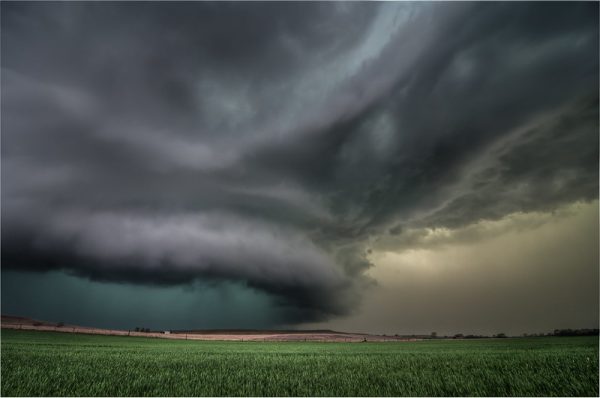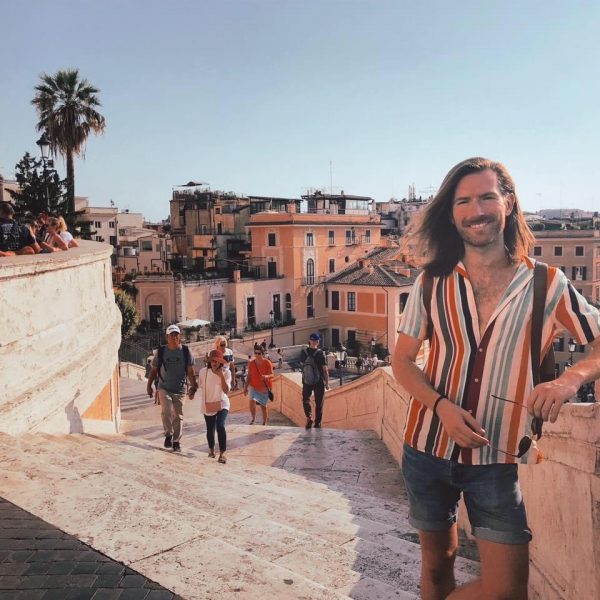 By Colorado Review editorial assistant Michael Todd
By Colorado Review editorial assistant Michael Todd
“Good storms can break down a barn, pull planes out of the air, drive straw through a tree trunk. There is nothing so massive as a storm gathering over the plains.”
Where I’m from in Southwest Virginia—not plains, but hills and mountains in hazy watercolor aquas and occasional periwinkles—the winds thrash on mild days, sending wreaths and soccer balls into and across the fields. When storms are heavier, we know to stay inside. Once, during a tornado watch (not warning), our carport was blown several yards and rotated a full ninety degrees, leaving the tractor and cars exposed. On these days, the dogs whimper and pace, whimper and pace. They howl several seconds before our human ears detect the shrill of sirens, backup chorus to the sounds of the dying or injured. We are used to their wail constantly throughout major holidays.
But in his essay “Monsters,” from the Spring 2021 Issue of Colorado Review, David Franke and his siblings find themselves in the path of a different kind of storm; a slower burn, a more thorough build as the narrator, in a moment of awareness and responsibility that punctures his childhood, moves around the house preparing for the coming storms—the “tornado dragg[ing] its tail across the ground,” inching steadily closer, yes. But this storm, although a stunningly appropriate allegory, is still not the storm with which Franke is truly concerned.
“My dream was to crawl up under a bridge abutment when a tornado came so I could watch it come close, and all I’d have to do is hang on.”
Our narrator gets his wish: he encounters the storms, and he holds on tight enough to relay the tales to us. One of many things that captivated me about Franke’s essay is what is visible of the violences of these storms, the literal and the symbolic; of what the narrator does, and doesn’t do, when he comes face to face with these forces. “Household objects can become dangerous weapons.” Household objects like “hoes, rakes . . . bicycles and pieces of wood, the wheelbarrow, the bow saw,” yes, but also, “the bedroom’s hollow-core door,” and “Hamburger Helper with bits of Sunday’s roast” and “red Gallo wine poured from a heavy gallon bottle.” Perhaps even his mother’s copy of Zelda, a biography in which Fitzgerald “accuses her husband of something terrible.”
When reading “Monsters,” it might be easy focus on the father’s abuse, vivid and bodily as a storm itself, in the middle of the essay—to focus on the literal destruction of material things. It is an all-too-familiar narrative. But the miracle of well-wrought creative nonfiction is its ability to make new again the familiar and, by doing so, complicate our relationship with something we thought we understood. “Monsters” is an essay about a certain abuse, but also of transformation—or of destruction as a kind of transformation: the subtle revelations of the narrator, not even fully understood in the moment, in his witnessing of the evolution of his father, and what that trajectory does to a marriage. It is an essay about the anticipation of waiting for a storm, of anticipating its damages, of trying to stay out of its path. But by the end of the piece, one stormed past, we understand that avoidance isn’t an option for the narrator and his family. By the end of the piece, we understand that the family exists within a storm, or a similar force; or, if not exists within one, exists in that slow build before the storm finally hits. By the time the narrator “came to understand that there was something wrong with [his] parents, something wrong with all of [them],”and that “[they] were monsters,” we already know that monstrosity could be the byproduct of some other desire, unnamed and unseen but felt as if the turbulence of a cyclone strong enough to pull a plane from the sky. If a literal storm could do such damage, what of the storm of a crumbling marriage? Or a father’s forbidden desire? Or a father’s rage?

Michael Todd is a second-year MFA candidate in creative nonfiction at Colorado State University, teaches for the composition and rhetoric department, and works as an editorial assistant for Colorado Review. After earning their BFA in Sculpture and Extended Media from Virginia Commonwealth University, they worked freelance as a writer, teacher, and scenic artist, among other hodgepodge arts jobs (and loved every moment). Recent work has appeared in Hippocampus and Foglifter Press’ anthology Home is Where You Queer Your Heart.
Photo (top of page) by Lane Pearman on Flickr.